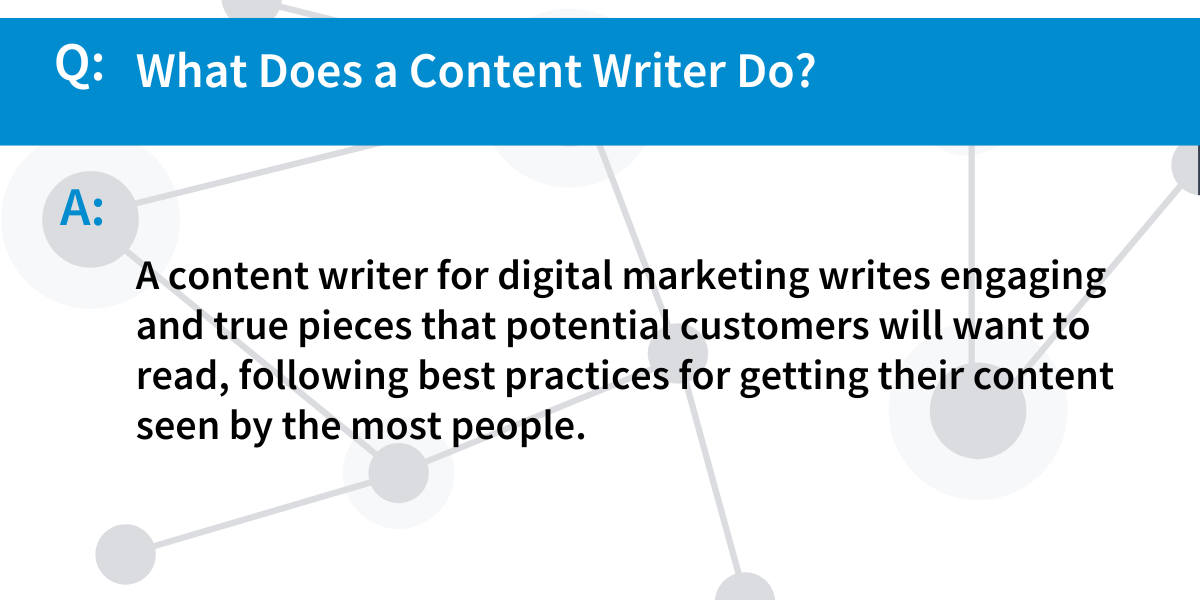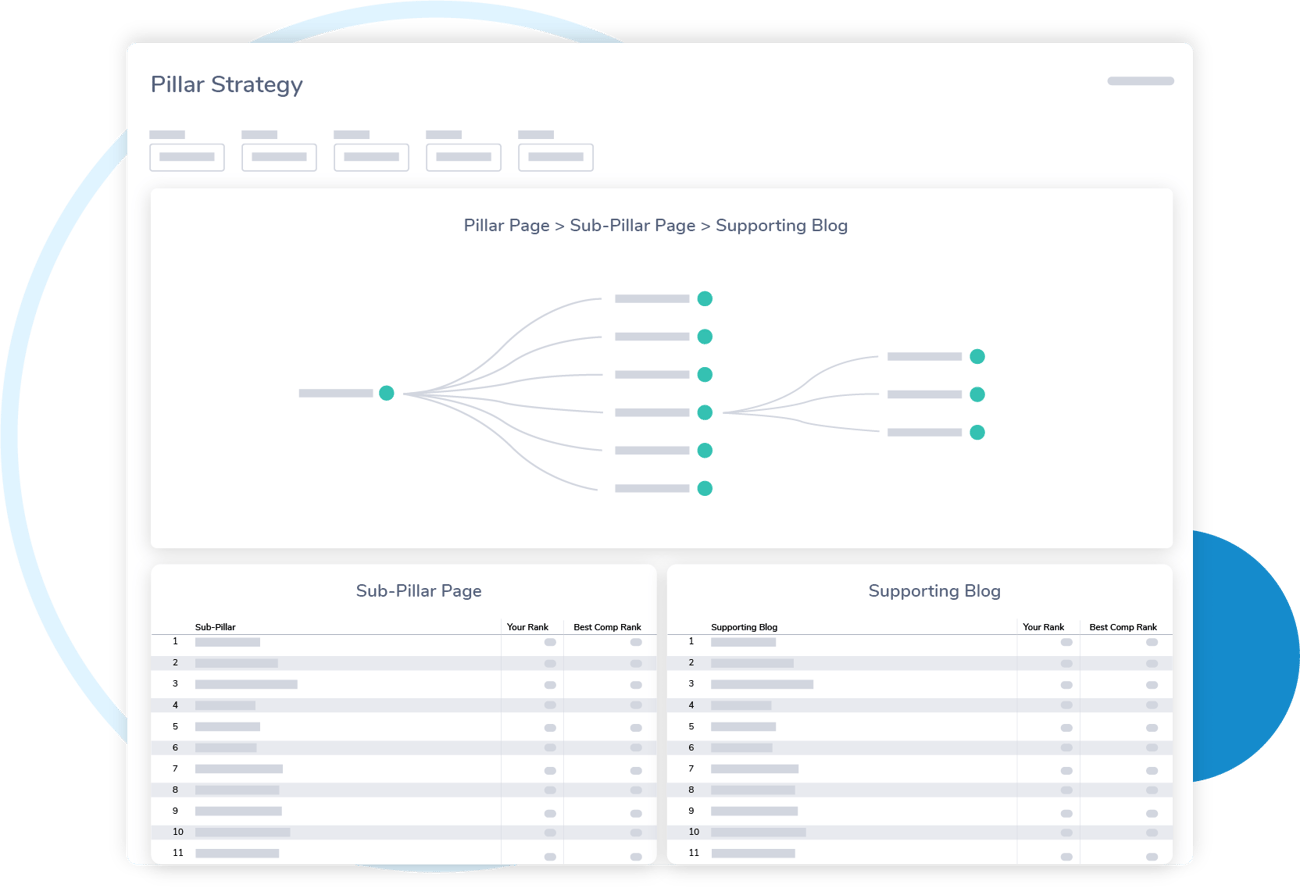“There’s no rule on how to write,” said Ernest Hemingway. “Sometimes it comes easily and perfectly; and sometimes it’s like drilling rock and then blasting it out with charges.”
As Hemingway so elegantly puts it, writing can be easy or a huge challenge, and content writing is no different than any other type of writing in this way. In some ways, though, a content writer has an easier time, because the purpose of their writing is usually laid out fairly clearly, and there are set expectations about what they will produce and what rules they should follow.
In modern day marketing, written content has become the very best tool for driving traffic and growing customer base, so content writing plays a mission-critical role in every business. In this article we’re going to go over exactly what content writing is, how it’s done, why it matters, and how to do it better.
What Is Content Writing in Digital Marketing?
Content writing jobs for digital marketing have the specific aim of writing pieces to market a business, either directly to consumers, or to other businesses. There are a huge range of pieces that can accomplish this, everything from writing a blog, to composing a social media post, to creating a script for a webinar. But the main purpose for all of the marketing content writing is ultimately to raise awareness of and drive sales to a business.
Just like there is a large range of formats content writing can take, there is similarly a huge range of content writing topics for digital marketing. The best place to start with topics is to write about what your potential customers are looking for, so your content is read by people who would benefit from the business you’re writing for.
What Does a Content Writer Do?
 A content writer for digital marketing writes engaging and true pieces that potential customers will want to read, following best practices for getting their content seen by the most people. A content writer might provide content writing services for multiple companies, and be given set criteria for exactly what pieces to write and in what format for each. Or, a content writer may be in the marketing department for a specific company and responsible for broader marketing plan decisions, like deciding what types of content would be most effective and which topics it should cover.
A content writer for digital marketing writes engaging and true pieces that potential customers will want to read, following best practices for getting their content seen by the most people. A content writer might provide content writing services for multiple companies, and be given set criteria for exactly what pieces to write and in what format for each. Or, a content writer may be in the marketing department for a specific company and responsible for broader marketing plan decisions, like deciding what types of content would be most effective and which topics it should cover.
In either case, these are some of the most common content writing examples:
- Website content
- Blog content
- Social media posts
- Ads and sales copy
- Webinar scripts
- Video scripts
- Ghost writing
- Article writing
- Case studies
- Infographic copy
- Email content
- Proposal writing
- Technical writing
Obviously, there are a lot of different types of content out there that you could be writing, and this list isn’t even every possibility. Ultimately, any writer supports their employer through content creation, regardless of formal job title.

What Is a Content Writing Example?
You might still be asking yourself “But what does a content writer actually do?” so here are some examples of what a content writer might create.
Educational Content Writing Examples
This piece that you’re reading right now is an example of educational content writing. The writer was given the assignment to write a 3,000 word article about content writing that will be used on the DemandJump website to educate people who search for topics related to content writing. Within this assignment, they were asked to use at least 20 keywords and questions that the DemandJump platform identified as having a high value for potential customers.
Social Media Content Writing Examples
Content writing on social media often calls for a much different style than a more formal website page or blog article. You may be given an assignment to raise brand awareness and show your company’s care about nature by writing a LinkedIn post about a relevant news article. Your task then involves finding an interesting article related to both nature and the company’s interests from a credible source, then summarizing it in an interesting way that will likely perform well on the specific platform of LinkedIn. This is an example of one way that could look:
When most of us think about cities, frog mating calls aren't the first thing that come to mind. But an interesting study published in Nature Ecology and Evolution shows that túngara frogs in Panama City make their mating calls longer and more complicated when they move to the city, compared to their rural relatives.
What does city life have to do with it? In rural areas, male túngara frogs have to limit their mating calls because the longer they call, the more likely they are to attract predatory bats or parasitic mites. But the bright lights and human inhabitants of cities keep these frog eaters at bay, so male frogs can serenade as long as they'd like!
Read more about this phenomenon and what it can tell scientists about cities and their effects of other animal behaviors here.
Website Content Writing Examples
Often web content is best kept short and sweet, focusing on telling website visitors exactly what to do to find what they’re looking for. This is the website copy from the homepage of DemandJump as an example:

Marketing Content Writing Examples
Oftentimes, marketing needs specific content written to achieve a certain marketing aim. This might be things like:
- The text of a welcome email sent out when a customer signs up for a newsletter
- A whitepaper outlining the specifics of how a product or service works
- A press release about a new business partnership
How Do I Start Content Writing?
Whether you want to start writing content as a new career, or you want to improve your existing professional writing skills, here are some of the best practices for getting started:
- Learn How to Create Outlines: Writing is much less intimidating if you write down your main objective and outline what you want to say. Look around at content writing outlines and templates to find a style that will work well for you.
- Use Tools for Editing: From the built-in spelling and grammar checker in many word processors to paid tools like Grammarly, many programs can help you review and edit work.
- Go Public and Get Feedback: If you’re building a portfolio on your own, publish your content on your personal website or a site like Medium to get feedback from others online. This will not only help you get better at writing, it will also help you learn to remove ego from the process.
These tips will be useful along the timeline of the writing process at different points, helping you stay focused, gain confidence, and learn what readers think of your voice and perspective.
How Do Beginners Learn Content Writing Skills?
Content writing for beginners (or those looking to improve) only gets better with practice and refining your technique, so the best way to learn is to get started and then stick with it. Here are some of our best tips for leveling up your writing skills:
- Choose Interesting, Specific Titles and Headlines: A specific title helps the writer frame the content and keep the goals of the piece in mind. In the same vein, having clear headlines for the sections within the article will help each segment stay focused on one topic, with a clear transition to the next section. The DemandJump platform helps with both these goals by showing you the most searched for keywords and questions around your topic so you can structure your content writing around these high value titles and headlines.
- Create an Attention-Grabbing Introduction: An interesting title might get someone to click on your content, but if you don’t catch and keep their attention right away, they aren’t going to keep reading. Don’t tell them what they already know, and don’t talk to them like they should already know what you’re going to say. Lastly, don’t immediately talk about why they might not consider the information you have to share important. Instead, think of a positive, exciting way to catch and keep their attention. In this article, we used the Hemmingway quote about writing to grab your attention.
- Focus on a Single Topic: Sometimes, writers want one piece of content to explain everything and tell it all. But just because this is what you want doesn’t mean it is what audiences are interested in. Focus on a single topic as you are writing. If new ideas or tangents come to mind, that’s great. Just leave those for your next project.
- Define Your Voice and Tone: Storytelling is a major element of good content writing. So, how do you want to tell your story? Is it supposed to be exciting, scary, encouraging, or motivating? These thoughts will determine your tone - the attitude with which you share the message. There are also considerations of voice, or how you want audiences to walk away thinking about your brand. Do you want to seem friendly, smart, approachable, or professional, and no-nonsense? Some of these might be possible at the same time, but others will be mutually exclusive. Deciding how you want to come across is an essential part of content writing.
- Get Others to Help You Edit: No good creative work can be completed in a vacuum. Even something small and low-stakes like a Tweet or Facebook post will benefit from the review of another person. This could be a stakeholder on your team at work, or a peer who is also doing writing. This added insight will help you fix everything from minor typos to big issues with the order of information, your reasoning, or a mismatch of voice and tone.
These five tips for how to write content are a great place to start. The first few content writing samples from beginners might feel very hard to write, but content writing does get easier and better with practice! If you’d like a chance for even more practice, DemandJump University offers free resource library in Marketing Content Writing and even includes submitting an assignment to be graded by our content writing experts.
Developing Content Writing Skills for Research
Audiences don’t just want entertaining content that is fun to read: they also want content they can trust and share with others. They do not want to find out that what they read from your company’s website was misleading or untrue. This potential to alienate your customers with bad content is one reason that well-researched content is essential to marketing.
Another benefit of developing your content research skills is that research actually makes content writing easier. With good research studies and authoritative insights from news or thought leaders on your side, you don’t have to tell the entire story on your own. Instead, you can let authorities speak where they say it best and fill in the gaps in your brand storytelling.
By drawing on sources and data about what is happening in your industry, you can find statistics and examples that help you make points. Not only will this make your work clearer and more compelling, it will also build your reputation as a trusted source of information with your potential customers.
Tips for Developing Content Research Skills
Here are some practical tips and strategies for how to get better at content research:
Start with a Google Search: A Google search for your primary topic is a great place to start any content writing research. First, this lets you see the top-ranked pages for your pillar topic. Then, once you review those pages, you’ll start to have more questions about the information, leading you to look up more specific information or statistics.
- Pro Tip: Include words like “statistics,” “survey,” or “report” in your search terms, so Google can direct you past the fluff to more hard numbers. You can also add quotation marks around a word to make sure they’re included in the results.
Stick with Quality Sources: There is lots of information on the Internet, and more is added every minute. But that doesn’t mean it’s all real or accurate. Developing research skills is learning to tell a quality source from a not-so-good one. Is there an author of the content identified? Does the website where you found the content have any authority in the field? If it’s not clear where it came from, you probably don’t want to cite it.
- Pro Tip: Wikipedia is not an ideal source to link to, but it can lead you to many great sources. Scroll down to the bottom of the entry you’re reading to find the list of sources that have been used to create it.
Verify Information: Even the most reliable-seeming sources can be outdated, inaccurate, or even just have a typo. Whatever information you’re sharing, it’s advised to check and make sure it can be verified across several sources. You can copy-paste a statistic into the search bar or compare predictions and expert insights.
- Pro Tip: While all the sources don’t have to say identical things, it’s best if at least two other reliable, quality pages can confirm the fact, data point, or perspective you’re citing. Sites with .org, .edu, and .gov URLs are generally more reliable.
Don’t Fight the Data: Sometimes, we set out to find information about a topic, only to learn there was a lot we didn’t know. In these cases, the ethical thing to do is to change the structure and plan for your content. This might mean choosing a new topic or pivoting the idea. But what you should never do is alter facts or misrepresent the situation.
- Pro Tip: This insight is why research can be an important part of the outlining process we mentioned earlier. A quick five-minute search and skim of sources before committing to the idea can save a lot of time in the long run.
Research Off the Web: Lastly, while there is lots of information on the Internet, it’s certainly not the only source of knowledge, and sometimes it’s not even the best one. Marketing content writers can also use insights from subject matter expert interviews, audience polls, surveys, books, magazines, and personal experience to inform content writing.
- Pro Tip: Record any interviews you conduct, so you can refer back to them later for quotes or to re-check anything you might have missed. Remember to always get the subject’s permission before you record!
SEO and Content Writing Skills
Search engine optimization writing, or SEO writing, means making sure your writing is following best practices to rank high in search engine results. SEO is constantly changing, so staying up to date with current SEO best practices will be an important part of the job of a content writer. It generally involves making sure to include high quality keywords and phrases in the best places and at the best rate for what search engines are looking for.
Not that many years ago, best practice was to put the desired keyword into a piece as many times as possible. This is known as keyword stuffing, and it could quickly make the actual article make less sense because of all the repetition. Fortunately, search engines have gotten better at spotting language actual humans want to read, and keyword stuffing is no longer considered best practice for content writing anymore.
Now the best practice for SEO is a technique DemandJump is pioneering, called Pillar Based Marketing. It involves building a structure to your articles and blogs of the longest, broadest, most important piece at the top (called a pillar) and shorter, most specific pieces (called sub-pillars and supporting blogs) underneath. Using a specific linking structure between these elements and having good quality writing are now much better ways for SEO.
Here are some of the current best practices for SEO and content writing:
- Titles: Use the keyword or phrase you want to rank for most in the title. For your most authoritative pieces of content, use very short phrases that cover your topic most broadly. For supporting blogs that link to and add authority to these longer pieces, choose popularly searched for long-form questions as titles.
- Headings: You want to break up your written content to make it more readable for your audience. This gives you the opportunity to add high-value keywords and especially questions as your headers. Search engines can identify these headers as the main topic of your content and make it rank more highly.
- Metadata: This is the snippet that shows up underneath your link in search engines, which plays a major role in getting your content to rank. Make sure to include as many words from the title of your article as possible, but also provide an accurate summary of what the piece is about.
- Body Copy: Select the number of high-value keywords most appropriate for the length of your piece, then make sure to use them. Cramming more uses of the same phrases into a piece doesn’t help with search engine rankings these days, but using a variety of phrases that many people search for does. A good basic rule is about 1 keyword or question per 100-150 words of content length. So a 750-word blog would have 7-8 keywords, while a 2,000 sub-pillar should have 15 or more.
Doing keyword research and setting the SEO strategy for content may or may not be the job of the content writer. If you are providing a content writer with keywords or looking for your own, it’s best to start with a larger list than needed and weed out the keywords which don’t fit the piece. For example, the content writer for this piece started with a list of 45 keyword phrases and questions. They added them to the writing as they made sense, until they reached the final goal of 20 being included throughout this 3,000 word piece.
The organic presence of keywords audiences are searching for is one of the most important factors. Many marketers consider SEO one of the most valuable tools in content marketing.
Here are a few more tips for SEO writing that can help you use keywords well and get closer to the top of the search:
- Target Multiple Keywords: Users don’t always search the Web using two or three word phrases. While shorter keywords may be your most-desired target, remember to include questions and longer phrases related to the keyword as well. You can use free tools like the “People also ask” section of Google to find out the questions and long search phrases. Or better yet, subscribe to an all-in-one content planning platform like DemandJump.
- Aim for the Answer Box: For queries including “how to,” “what is,” and “list of,” Google shows an answer box at the top of the results. This snippet is chosen from all the content available based on what is well-formatted and provides a logical answer to the question. If you include a headline with this phrasing and follow it with a numbered or bulleted list, that gives you the best chance of having your content featured.
- Optimize Through Updates: Even the best-written or best-produced video will eventually become outdated. SEO writing doesn’t just mean creation, but also revision. This means you should go back to your content that performed well when it was first published, update your statistics, and tweak the keywords to align with any new changes in strategy. This best practice keeps all your content optimized and is a low-effort way to get a boost in search rankings.
Like research, a list of SEO keywords can make content writing easier. When keywords help a content writer decide the title and headlines of a piece of content, the framework is then partially built for them. Within this structure, the creative professional can shine.
DemandJump: Showing You Exactly What Content to Create to get to Page One
These tips and insights should go a long way toward giving any content writing project better momentum. While writing is never a simple affair, it can be made easier, when you use cutting-edge tools like DemandJump.
DemandJump was created to share real-time keyword recommendations that are perfectly aligned with current consumer behavior. Our machine learning algorithm shows you the volume of searches and most popular questions and keywords around your topic. This means writers can use the exact topics and keyword phrases that audiences are searching for.
Competitor insights are also integrated, so writers can see what content is currently ranking for the same keywords. This allows content writers to make more educated decisions about where to focus their efforts to win page one results.
DemandJump is the dynamite tool that will help your content writing and marketing explode to the top of the search rankings. End the struggle and let us streamline your content writing process. Sign up for our free plan today, and start experimenting!










 A content writer for digital marketing writes engaging and true pieces that potential customers will want to read, following best practices for getting their content seen by the most people. A content writer might provide content writing services for multiple companies, and be given set criteria for exactly what pieces to write and in what format for each. Or, a content writer may be in the marketing department for a specific company and responsible for broader marketing plan decisions, like deciding what types of content would be most effective and which topics it should cover.
A content writer for digital marketing writes engaging and true pieces that potential customers will want to read, following best practices for getting their content seen by the most people. A content writer might provide content writing services for multiple companies, and be given set criteria for exactly what pieces to write and in what format for each. Or, a content writer may be in the marketing department for a specific company and responsible for broader marketing plan decisions, like deciding what types of content would be most effective and which topics it should cover.